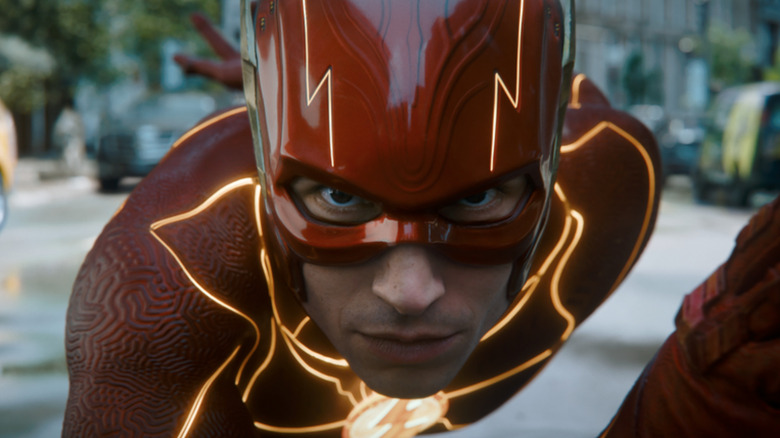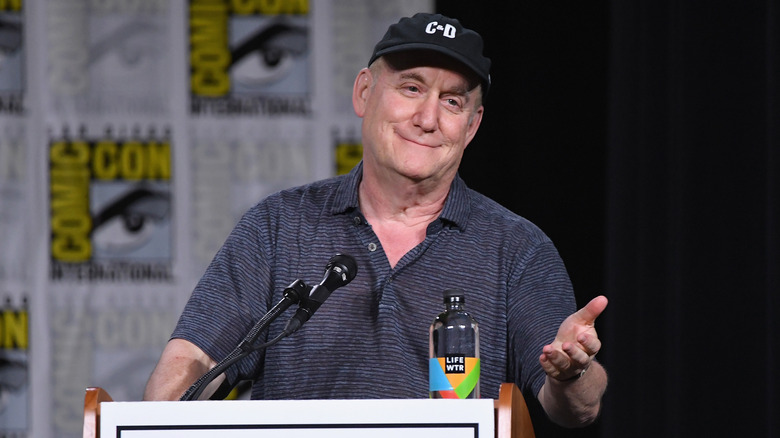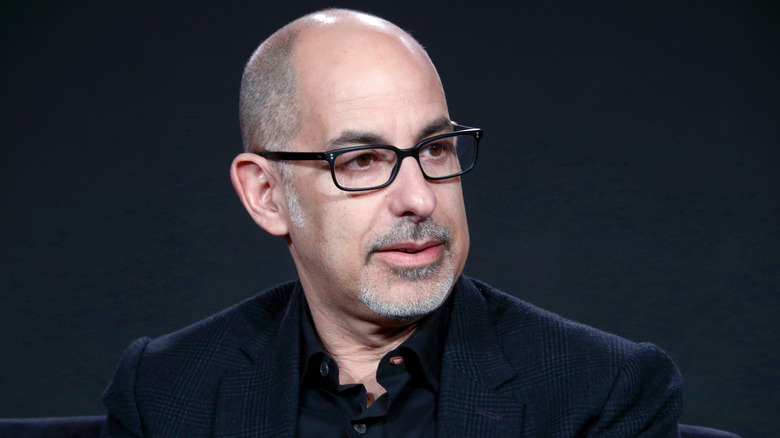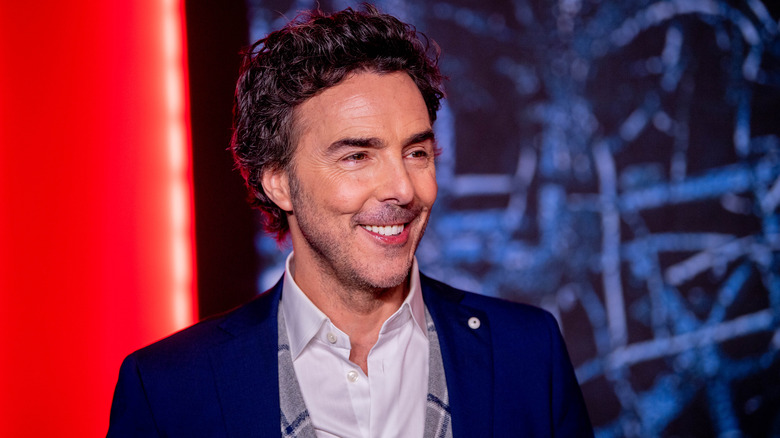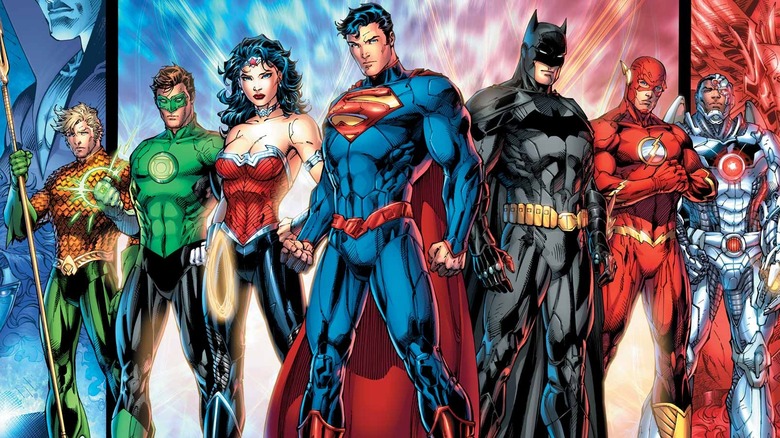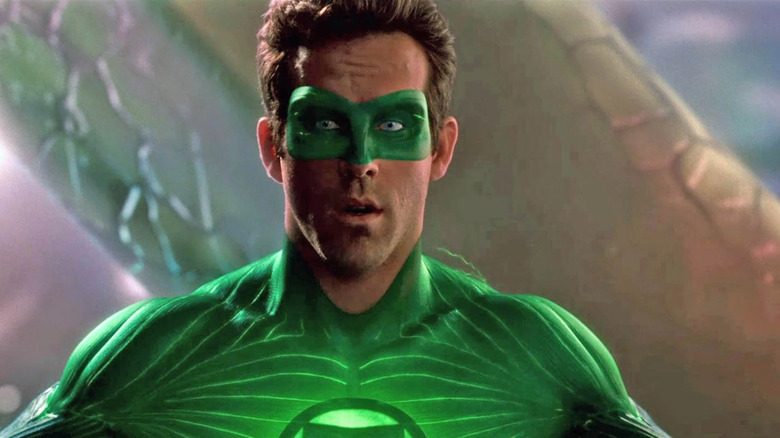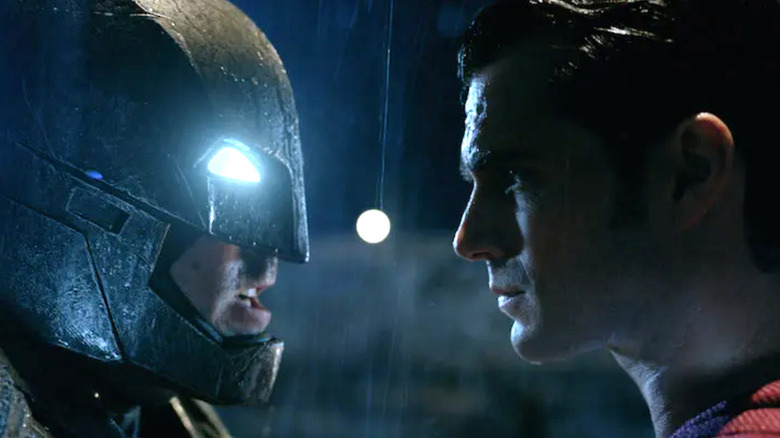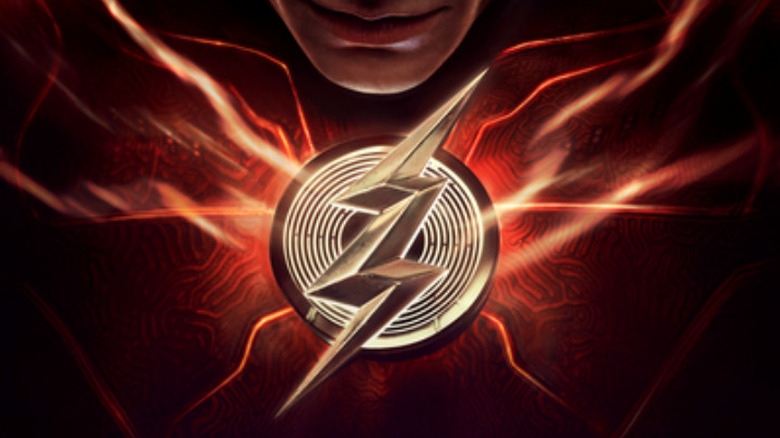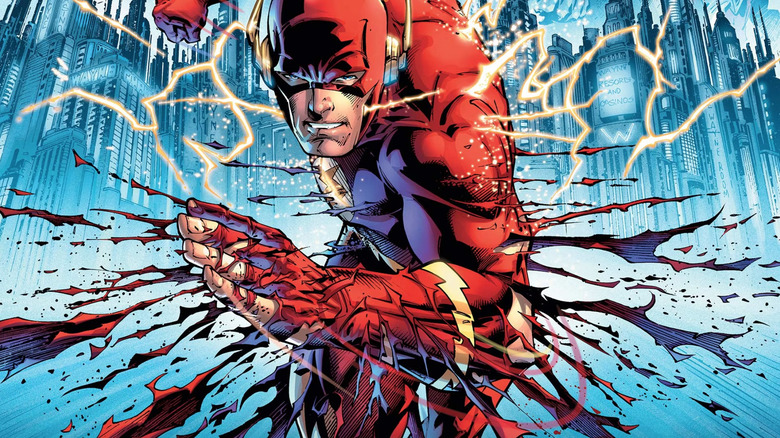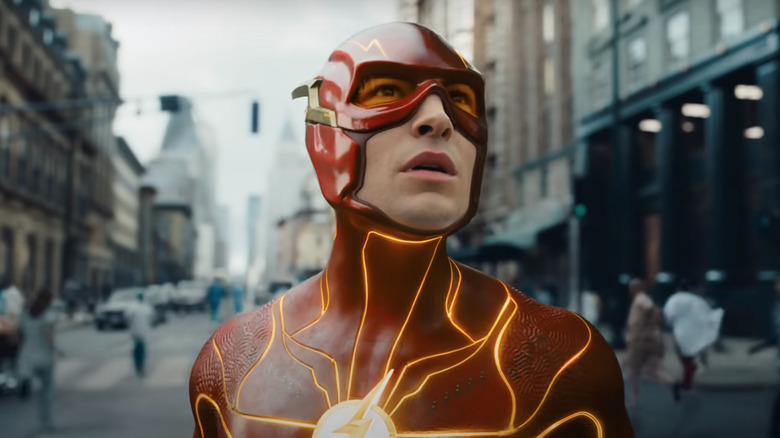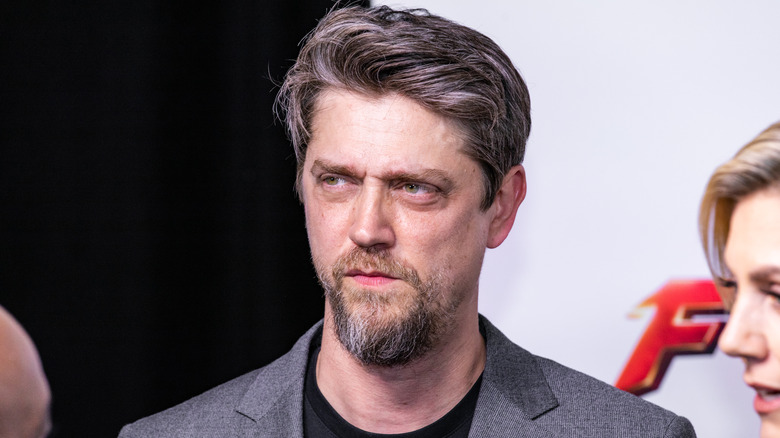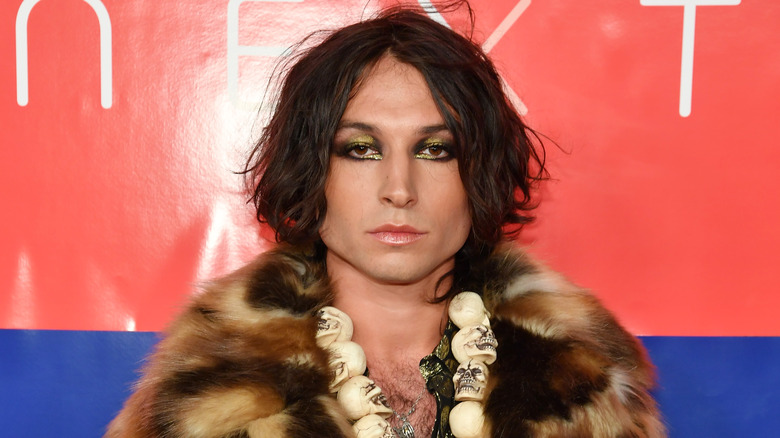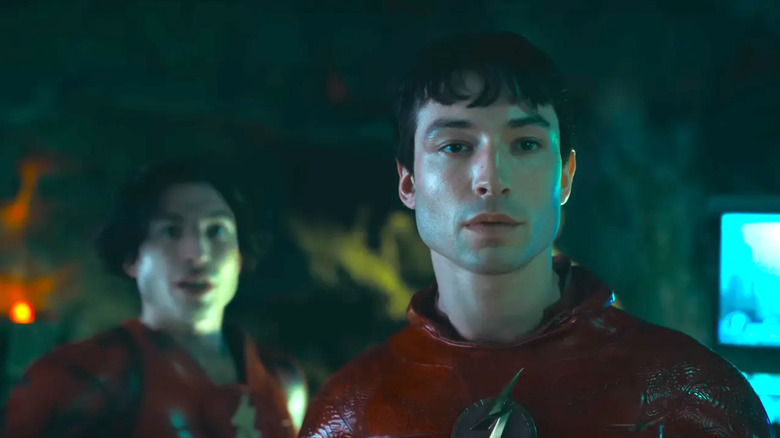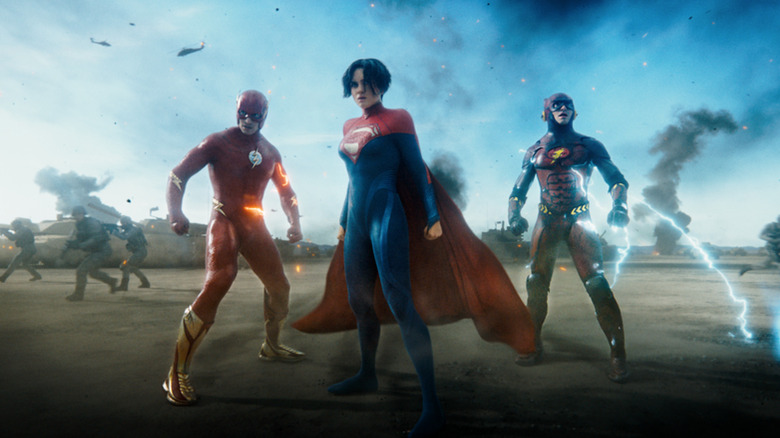The Messy History Of The Flash Movie Explained
Created in 1940 by writer Gardner Fox and artist Harry Lampert, DC comic book character the Flash sprinted onto the superhero scene with his superhuman speed, reflexes, and interdimensional travel. Although multiple incarnations of the Flash exist within the comic book world, the long-awaited 2023 release of the feature film "The Flash" follows Barry Allen (Ezra Miller), a forensic science student with a tragic past who obtains his superpowers after a S.T.A.R. Labs incident. In an attempt to prevent his mother's death and the false imprisonment of his father, Barry goes back in time — but not without dire consequences.
Nearly a century after the Flash was first introduced in "Flash Comics" #1, the fastest man alive finally got his own feature film within the DC Extended Universe (DCEU). But long before the DCEU's inception or the popularization of superhero films, development for a Flash movie began all the way back in the late 1980s. So why did it take so long for this speedster to make it onto the big screen? Decades of rewrites, changes, creative differences, poor timing, delays, and controversy have plagued every stage of production. Luckily, no time travel is required for us to revisit and examine the messy history of "The Flash" movie.
Development began in the late 1980s
It's 1987, and while riding the success of his two writing credits on the coming-of-age comedy "Teen Wolf" and action movie "Commando," writer Jeph Loeb released two more movies back-to-back: "Burglar" and "Teen Wolf Too." Around this time, Warner Bros. approached Loeb to work on a Flash feature film. Long before the DCEU and its rival Marvel Cinematic Universe (MCU), superhero movies as we know them were first introduced on the big screen in 1978 with "Superman: The Movie" and later with "Batman" in 1989. Although successful in their own right, superhero movies weren't nearly as ubiquitous as they are today. Perhaps this is why Loeb's script was never finished, but one can only imagine how his take on the superhero would've turned out.
Although it never came to fruition, the opportunity presented a career shift for the writer. Meeting with the then-president of DC Comics, Loeb was encouraged to write a comic of his own, which led to an extensive career as a comic book writer and later as the Executive Vice President and Head of Marvel Television. Loeb also went on to write and produce episodes of the superhero television series "Smallville" and "Heroes."
David S. Goyer tried to revitalize the project more than a decade later
In 2004, "Nick Fury: Agent of S.H.I.E.L.D." and "Blade" writer David S. Goyer finished the script for the 2005 release of "Batman Begins," marking the beginning of Christopher Nolan's "Dark Knight" trilogy. Impressed with his work, Goyer was hired by Warner Bros. to revitalize the Flash project as a writer, director, and producer. "I think the character of the Flash, who moves faster than the speed of light, opens itself up to rich cinematic and story ideas," Goyer expressed when the news was first announced, via Variety.
In an interview with Moviehole, Goyer discussed his approach to the film, describing it as lighter in tone, similar to Sam Raimi's "Spider-Man." Rather than using the character Barry Allen, Goyer decided to write the story centered on Barry's nephew Wally West, who was rumored to be played by "Blade: Trinity" star Ryan Reynolds. A script was developed in 2006, but by 2007, Goyer announced he was leaving the project due to creative differences, writing on his MySpace page, "The God's honest truth is that WB and myself simply couldn't agree on what would make for a cool Flash film. I'm quite proud of the screenplay I turned in. I threw my heart into it and I genuinely think it would've been the basis of a ground-breaking film. But as of now, the studio is heading off in a completely different direction."
Shawn Levy's new iteration
During this time, Warner Bros. was also working on the movie "Justice League: Mortal" with "Mad Max" director George Miller to kick off a DC cinematic universe (separate from the DCEU we know today). With a projected 2009 release, the movie would debut Adam Brody (then best known as Seth Cohen on "The OC") as the Flash, alongside DC Comics' biggest superheroes. In preparation for a Flash feature spin-off, the studio hired "Night at the Museum" director Shawn Levy to helm the project, overseeing the writing of a new story draft in addition to directing. Levy intended to create a lighter tone for the upcoming superhero movie, as opposed to the darker tones of previous DC movies like "Batman Begins" and "Superman Returns."
Unfortunately, it wasn't long before Levy left the project due to scheduling conflicts with his sequel "Night at the Museum: Battle of the Smithsonian." "We were doing development, and getting interesting places on the script, but they wanted someone with more time and focus than I was able to promise," Levy explained to MTV. Soon after Levy's departure, "Wedding Crashers" director David Dobkin was announced to fill the role. Under Dobkin, the movie still planned to feature Wally West and follow the highly-anticipated "Justice League: Mortal" storyline.
Justice League: Mortal is scrapped
Leading up to the production of "Justice League: Mortal," the movie faced a number of complications that lead to its eventual cancelation. The 2007-2008 Writers Guild of America strike may have caused the most damage, delaying filming for the strike's three-month duration. By this time, Nolan's "The Dark Knight" had been released and was met with critical acclaim, making Warner Bros. hesitant to move forward with the "Justice League: Mortals" iteration of Batman, played by Armie Hammer.
When the "Dark Knight" trilogy's Batman, Christian Bale, was asked about the decision to recast the character for "Justice League: Mortal," he said to IESB.net at a 2007 press junket, "It'd be better if it doesn't tread on the toes of what we're doing, though I feel that it would be better if it comes out after Batman 3." Warner Bros. ultimately agreed with Bale's sentiment and ended up scrapping the movie altogether to focus on individual superhero movies. With no kick-off movie, Brody was out, and the Flash's future was as unpredictable as lightning striking.
Green Lantern writers take over
One of those individual superhero movies Warner Bros. started working on was 2011's "Green Lantern." A year before its release, the movie's writers — Greg Berlanti, Michael Green, and Marc Guggenheim — were brought onto "The Flash" project after screenwriter Dan Mazeau and comic book writer Geoff Johns' efforts to rewrite the screenplay in 2009. According to the announcement, this version of the movie aimed to draw inspiration from Johns' recent work and feature the Barry incarnation of the character.
In the eyes of Warner Bros. executives, there was still a world where this movie could be made, but after the disastrous reception of "Green Lantern," the studio decided against the trio's involvement and went back to the drawing board. It was also around this time that Warner Bros. was gearing up for a major DC overhaul in the wake of Marvel's success. As for Berlanti and Guggenheim, they went on to helm the CW's Arrowverse along with Johns, so it's possible some of their ideas for the feature made their way into "The Flash" TV series.
The DC Extended Universe is born
The commercial success of Marvel's 2008 "Iron Man" movie empowered the studio to roll out an elaborate franchise plan known as the MCU. By the time "The Avengers" hit theaters, dominating the box office and changing the entertainment landscape as we know it, Warner Bros. knew they needed to find a way to compete. Building off the 2013 release of "Man of Steel," the studio announced "a massive expansion of the Studio's DC Entertainment-branded content," otherwise referred to as the DCEU.
In their plan, 10 movies were slated to be released from 2016 through 2020, starting with "Batman v Superman: Dawn of Justice." Also on that list was a 2018 release for "The Flash" starring "The Perks of Being a Wallflower" rising star Ezra Miller. They had the plan, and they had the actor. Now all they needed was to find a writer and director (again).
Who will write and direct?
In 2015, things were shaping up for Warner Bros. when they found their writers in "The Lego Movie" duo Phil Lord and Christopher Miller, and hired novelist and screenwriter Seth Grahame-Smith to direct shortly thereafter. "The Flash" would have marked Grahame-Smith's feature directorial debut, but less than a year later, the writer left the project due to creative differences. Warner Bros. decided to keep Grahame-Smith's script written using Lord and Miller's treatment and quickly hired "Dope" indie director Rick Famuyiwa as Grahame-Smith's replacement.
However, as was becoming tradition for this film, Famuyiwa left the project as quickly as he was hired due to creative differences. "While it's disappointing that we couldn't come together creatively on the project, I remain grateful for the opportunity," Famuyiwa said in a statement. At this point, the pendulum had swung, and it was no longer looking good for Warner Bros. Filming was scheduled to begin in early 2017 for the 2018 release, but without a director, they had no choice but to delay production.
Delays and title changes
While searching for a new director, Warner Bros. hired screenwriter Joby Harold for a complete rewrite of the script. As per Harold's rewrites, "The Flash" experienced a title change to "Flashpoint" in 2017, the name of the 2011 comic book series where the Flash goes back in time to prevent his mother's death. (As we know now, this was the story Warner Bros. decided to go with for the 2023 release of "The Flash.") But 2018 came and went, and "The Flash" was nowhere in sight. Instead, "Tomb Raider" took over "The Flash's" release date and left the speedster in a vacuum of uncertainty.
Ultimately, there was no reason to rush. Miller was busy filming "Fantastic Beasts: The Secrets of Dumbledore" while the ongoing search for a director continued. A year later, the title was changed back to "The Flash" when filmmaking duo John Francis Daley and Jonathan Goldstein were hired to direct. With the two onboard, filming was expected to begin in late 2019 for a 2021 release. But when have things ever gone as planned?
Ezra Miller wrote their own script
Unhappy with Daley and Goldstein's direction, Miller teamed up with comic book writer Grant Morrison to write their own version of the script on the heels of the star's contract renewal. The stakes were high. The two were given two weeks to turn in a script, and if Warner Bros. passed on it, it could mean Miller's departure from the project. "We had to be like the Flash to get this thing done, and they were looking for something quite different," Morrison told Rolling Stone. Their approach to the Flash story was in the vein of a "Back to the Future"-esque science fiction tale.
Unfortunately, Warner Bros. rejected the script. "It didn't do the job they were looking for, which was to franchise things and set things up, and bring other characters in. It was a Flash story, so it wasn't where they wanted to go with multiverse and stuff. And that was the end of it," said Morrison. But although they passed on the screenplay, Warner Bros. was able to convince Miller to stay on as the star.
Christina Hodson and Andy Muschietti replaced Daley and Goldstein
About a year into working on the project, Daley and Goldstein left quietly, citing creative differences as their reasoning. It's speculated Miller's insistence on writing a new script was one of these differences that didn't sit right with the pair. "It became clear that they [Miller] didn't want to quite do the same thing as we did," Goldstein told Variety. "We pitched this idea of a ground-level superhero where it isn't entirely end-of-the-world stakes," said Daley. "He's just learning his powers and is also somewhat dysfunctional with his life. The more imperfect we can make a superhero, the better, because that's the inherent challenge: How do you give imperfection to someone that is, you know, physically perfect?" Still, the two maintained story credits in the final cut.
With Daley and Goldstein out, "Birds of Prey" writer Christina Hodson and "It" director Andy Muschietti were hired, and this time, they were here to stay. However, filming was pushed back once again, and "The Flash" received a summer 2022 release date. But then, the unforeseeable happened. Due to the COVID-19 pandemic that shut down the entertainment industry, filming was delayed until April 2021, eventually wrapping in October 2021. Multiple release date announcements followed, but after some deliberation, Warner Bros. settled on a summer 2023 release.
Miller's controversies
2020 proved to be a turbulent year for Miller when concerning headlines regarding the actor began to surface. Miller's behavior first became worrisome when they retreated to an Iceland Airbnb during the pandemic shutdown. While there, it was reported that "cult-like" activities were taking place, with one woman comparing the environment to a "commune." "It was one of the weirdest days I've ever experienced," she told Insider. This news was followed by a viral video of Miller placing a woman in a chokehold.
News about Miller seemed to quiet down after the Iceland incidents, but in March and April 2022, the actor made troubling headlines once again after multiple arrests in Hawaii. The first was for disorderly conduct and harassment, and the other was for second-degree assault. It was also this year that Miller's problematic relationship with 18-year-old Tokata Iron Eyes came to light. Tokata's parents, Chase Iron Eyes and Sara Jumping Eagle, came forward and accused Miller of grooming Tokata since the age of 12, alleging incidents of sexual, drug, physical, and emotional abuse. In a text message to Insider, Tokata denied all allegations of grooming or abuse. Later in the year, Miller faced more legal trouble in Vermont for felony burglary and helping a mother of three evade the police.
If you or someone you know is dealing with domestic abuse, you can call the National Domestic Violence Hotline at 1−800−799−7233. You can also find more information, resources, and support at their website.
Warner Bros. and Miller's response
In the wake of Miller's highly-publicized controversies, many assumed "The Flash" movie would be derailed as a result. However, under the guidance of new Warner Bros. Discovery CEO David Zaslav, the studio decided to move forward with the project regardless. Just a few days later, Miller released a statement apologizing for their actions and announcing mental health treatment. "Having recently gone through a time of intense crisis, I now understand that I am suffering complex mental health issues and have begun ongoing treatment," said Miller. "I want to apologize to everyone that I have alarmed and upset with my past behavior. I am committed to doing the necessary work to get back to a healthy, safe and productive stage in my life."
If you or someone you know needs help with mental health, please contact the Crisis Text Line by texting HOME to 741741, call the National Alliance on Mental Illness helpline at 1-800-950-NAMI (6264), or visit the National Institute of Mental Health website.
Starting from scratch
After 30-plus years in the making, a lot is riding on the success of 2023's "The Flash." While it may not make or break plans for a prosperous DCEU, it would be a shame for a movie with so much history to be yet another insignificant drop in a vast ocean of superhero entertainment. With James Gunn and Peter Safran now leading DC studios with their "eight to ten-year plan," many wonder what the future has in store for their beloved Scarlet Speedster.
Although there's no telling whether or not a sequel will be greenlit, Warner Bros. does, in fact, have a script ready written by "Aquaman" writer David Leslie Johnson-McGoldrick. As for whether or not Miller would be recast in a potential sequel, Muschetti has said, "I don't think there's anyone that can play that character as well as they [Miller] did. The other depictions of the character are great, but this particular vision of the character, they just excelled in doing it. It feels like a character that was made for them."
